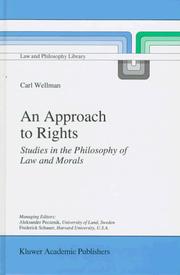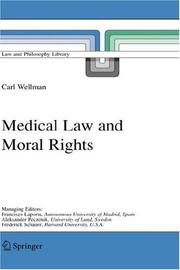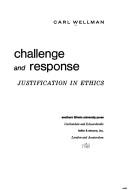| Listing 1 - 10 of 37 | << page >> |
Sort by
|

ISBN: 0792344677 9048148146 9401588120 9780792344674 Year: 1997 Volume: 29 Publisher: Dordrecht Kluwer
Abstract | Keywords | Export | Availability | Bookmark
 Loading...
Loading...Choose an application
- Reference Manager
- EndNote
- RefWorks (Direct export to RefWorks)
An Approach to Rights contains fifteen previously published but mostly inaccessible papers that together show the development of one of the more important contemporary theories of the nature, grounds and practical implications of rights. In a long retrospective essay, Carl Wellman explains what he was trying to accomplish in each paper, how far he believes that he succeeded and where he failed. Thus the author provides a critical perspective both on his own theory and on alternative theories from which he borrows, or that he rejects. These essays identify the problems any adequate theory of rights must solve, describe the more plausible solutions and weigh the merits of each. They will be of special interest to any reader concerned with legal theory, moral philosophy or any branch of applied ethics or social policy in which appeals to rights are frequently made but seldom rationally satisfactory.
Legal theory and methods. Philosophy of law --- Law and ethics --- Natural law --- Consent (Law) --- Human rights --- Civil rights --- Philosophy --- Moral and ethical aspects --- 810 Theorie en Methode --- 811 Filosofie --- 821.1 Volkenrecht --- 821.5 Mensenrechten --- 825 Ontwikkelingssamenwerking --- 841 Politiek Bestel --- 876 Veiligheidspolitiek --- -Human rights --- -Civil rights --- -Law and ethics --- Declaration of intention --- Justification (Law) --- Law of nature --- Natural rights --- Nature, Law of --- Rights, Natural --- Law --- Ethics and law --- Law and morals --- Morals and law --- Basic rights --- Civil liberties --- Constitutional rights --- Fundamental rights --- Rights, Civil --- Constitutional law --- Political persecution --- Civil rights (International law) --- Rights, Human --- Rights of man --- Human security --- Transitional justice --- Truth commissions --- Law and legislation --- Law and ethics. --- Natural law. --- Moral and ethical aspects. --- Philosophy. --- Consent (Law). --- Law of nature (Law) --- Nature, Law of (Law) --- Law—Philosophy. --- Law. --- Political science. --- Public international law. --- Constitutional law. --- Theories of Law, Philosophy of Law, Legal History. --- Philosophy of Law. --- Public International Law . --- Political Science. --- Constitutional Law. --- Constitutional limitations --- Constitutionalism --- Constitutions --- Limitations, Constitutional --- Public law --- Administrative law --- Law of nations --- Nations, Law of --- Public international law --- Administration --- Civil government --- Commonwealth, The --- Government --- Political theory --- Political thought --- Politics --- Science, Political --- Social sciences --- State, The --- Acts, Legislative --- Enactments, Legislative --- Laws (Statutes) --- Legislative acts --- Legislative enactments --- Jurisprudence --- Legislation --- Interpretation and construction --- Human rights - Philosophy --- Human rights - Moral and ethical aspects --- Civil rights - Philosophy --- Civil rights - Moral and ethical aspects
Book
ISBN: 9780199744787 0199744785 0199827133 9786612916526 0199826560 1282916521 Year: 2011 Publisher: Oxford Oxford University Press
Abstract | Keywords | Export | Availability | Bookmark
 Loading...
Loading...Choose an application
- Reference Manager
- EndNote
- RefWorks (Direct export to RefWorks)
Carl Wellman takes a broad approach to human rights by discussing all three types - moral, international and national - at length. At the same time, he pays special attention to the moral reasons that are relevant to each kind of human rights.
Social ethics --- Human rights --- Moral and ethical aspects. --- Human rights - Moral and ethical aspects.
Book
ISBN: 0673050130 Year: 1975 Publisher: Glenview, Ill. Scott, Foresman
Abstract | Keywords | Export | Availability | Bookmark
 Loading...
Loading...Choose an application
- Reference Manager
- EndNote
- RefWorks (Direct export to RefWorks)
General ethics --- Ethics. --- Social ethics.

ISBN: 1280413417 9786610413416 140203752X 1402037511 9048169534 9781402037511 Year: 2005 Publisher: Dordrecht Springer
Abstract | Keywords | Export | Availability | Bookmark
 Loading...
Loading...Choose an application
- Reference Manager
- EndNote
- RefWorks (Direct export to RefWorks)
Medical Law and Moral Rights discusses live issue arising in modern medical practice. Do patients undergoing intolerable irremediable suffering have a moral right to physician-assisted suicide? Ought they to have a comparable legal right? Do the moral duties of a mother to care for and not abuse her child also apply to her fetus? Ought fetuses to be given legal rights requiring pregnant women to submit to medical treatment without their consent? Ought single women, homosexual couples or persons carrying serious genetic defects to have a legal right to procreate? Ought a physician to perform an abortion requested for some frivolous reason? Ought physicians to be permitted to refuse to provide medically futile treatment demanded by their patients? An examination of relevant court cases shows how United States law answers these questions. The author then advocates improvements in the law to make it respect our moral rights more fully. To justify his conclusions, he proposes original conceptions of the human rights to life, procreational autonomy, privacy, equitable treatment and personal security. Thus, these essays test the usefulness of the theory of rights explained and defended in An Approach to Rights and elsewhere.
Law and ethics. --- Law --- Philosophy. --- Jurisprudence --- Medical law --- Human rights --- Professional ethics. Deontology --- Philosophy (General). --- Ethics. --- Medical ethics. --- Law. --- Philosophy, general. --- Theory of Medicine/Bioethics. --- Law, general. --- Theories of Law, Philosophy of Law, Legal History. --- Acts, Legislative --- Enactments, Legislative --- Laws (Statutes) --- Legislative acts --- Legislative enactments --- Legislation --- Biomedical ethics --- Clinical ethics --- Ethics, Medical --- Health care ethics --- Medical care --- Medicine --- Bioethics --- Professional ethics --- Nursing ethics --- Social medicine --- Deontology --- Ethics, Primitive --- Ethology --- Moral philosophy --- Morality --- Morals --- Philosophy, Moral --- Science, Moral --- Philosophy --- Values --- Moral and ethical aspects --- Law and ethics --- Ethics and law --- Law and morals --- Morals and law --- Law—Philosophy. --- Mental philosophy --- Humanities --- Bioethics. --- Moral Philosophy and Applied Ethics. --- History. --- Biology --- Life sciences --- Life sciences ethics --- Science --- Legal history --- History and criticism

ISBN: 0809304902 Year: 1971 Publisher: Carbondale : Southern Illinois University Press,
Abstract | Keywords | Export | Availability | Bookmark
 Loading...
Loading...Choose an application
- Reference Manager
- EndNote
- RefWorks (Direct export to RefWorks)
Judgment (Ethics) --- Reasoning --- Values --- Jugement (Morale) --- Raisonnement --- Valeurs (Philosophie) --- Reasoning. --- Values. --- Judgment (Ethics).
Book
ISBN: 3319315250 3319315269 Year: 2016 Publisher: Cham : Springer International Publishing : Imprint: Springer,
Abstract | Keywords | Export | Availability | Bookmark
 Loading...
Loading...Choose an application
- Reference Manager
- EndNote
- RefWorks (Direct export to RefWorks)
This work explains the nature of constitutional rights. It does so by means of an analysis of the nature of law in general, the nature of constitutions, and the nature of rights. It looks in detail at several aspects of constitutional law, rights and institutions, as well as aspects related to public officials, private persons and associations. In addition, the book critically examines a considerable number of debates about whether some actual or proposed constitutional rights ought to be established and maintained in the United States constitution. It then identifies the kinds of reasons that justify or fail to justify constitutional rights. The book advances the debate and makes a contribution to the theory and the practice of constitutional rights.
Philosophy. --- Political theory. --- Political science. --- Constitutional law. --- Philosophy of Law. --- Constitutional Law. --- Political Theory. --- Constitutional law --- Constitutional limitations --- Constitutionalism --- Constitutions --- Limitations, Constitutional --- Interpretation and construction --- Public law --- Administrative law --- Philosophy of law. --- Administration --- Civil government --- Commonwealth, The --- Government --- Political theory --- Political thought --- Politics --- Science, Political --- Social sciences --- State, The

ISBN: 0195095006 Year: 1995 Publisher: New York Oxford Oxford University Press
Abstract | Keywords | Export | Availability | Bookmark
 Loading...
Loading...Choose an application
- Reference Manager
- EndNote
- RefWorks (Direct export to RefWorks)
Law and ethics. --- Law --- Philosophy. --- Droit et morale --- Droit et éthique --- Law and ethics --- Recht en ethiek --- Recht en moraal --- Ethics and law --- Law and morals --- Morals and law --- Philosophy --- -Philosophy --- Jurisprudence
Book
ISSN: 2192855X ISBN: 1299198252 9400760078 940076006X Year: 2013 Publisher: Dordrecht : Springer,
Abstract | Keywords | Export | Availability | Bookmark
 Loading...
Loading...Choose an application
- Reference Manager
- EndNote
- RefWorks (Direct export to RefWorks)
This book presents a definition of terrorism that is broad and descriptive and much needed to prevent misunderstanding. The book identifies the features that make terrorism ‘wrong’, including coerciveness, the violation of rights and undermining of trust. Next, it evaluates reasons given for terrorism such as the protection of human rights and the liberation of oppressed groups as not normally justified. Following this, the book identifies and evaluates international responses to terrorism, taking into account General Assembly and Security Council resolutions, United Nations conventions and criminalization in international law. It also looks at national responses which often take the shape of surveillance, detention, interrogation, trials, targeted killings, intrusion and invasion. Finally, the book discusses how, if at all, the moral norms of personal morality apply to the actions of nation states.
Terrorism. --- Terrorism --- Prevention. --- Acts of terrorism --- Attacks, Terrorist --- Global terrorism --- International terrorism --- Political terrorism --- Terror attacks --- Terrorist acts --- Terrorist attacks --- World terrorism --- Anti-terrorism --- Antiterrorism --- Counter-terrorism --- Counterterrorism --- Law. --- Religion. --- Political theory. --- Ethics. --- Law --- Theories of Law, Philosophy of Law, Legal History. --- Criminology and Criminal Justice, general. --- Religious Studies, general. --- Political Theory. --- Philosophy. --- Direct action --- Insurgency --- Political crimes and offenses --- Subversive activities --- Political violence --- Terror --- Criminology. --- Administration --- Civil government --- Commonwealth, The --- Government --- Political theory --- Political thought --- Politics --- Science, Political --- Social sciences --- State, The --- Religion, Primitive --- Atheism --- God --- Irreligion --- Religions --- Theology --- Deontology --- Ethics, Primitive --- Ethology --- Moral philosophy --- Morality --- Morals --- Philosophy, Moral --- Science, Moral --- Philosophy --- Values --- Crime --- Criminals --- Study and teaching --- Law—Philosophy. --- Acts, Legislative --- Enactments, Legislative --- Laws (Statutes) --- Legislative acts --- Legislative enactments --- Jurisprudence --- Legislation --- Political science. --- Moral Philosophy and Applied Ethics. --- History. --- Legal history --- History and criticism --- Moral and ethical aspects. --- Prevention

ISBN: 1280527927 0195357388 142940602X 9781429406024 9781280527920 0195095006 9780195095005 0197731449 Year: 1995 Publisher: New York : Oxford University Press,
Abstract | Keywords | Export | Availability | Bookmark
 Loading...
Loading...Choose an application
- Reference Manager
- EndNote
- RefWorks (Direct export to RefWorks)
Providing a fresh theory of grounds for legal and moral rights, this treatise argues that only agents can be right-holders, that children and the mentally incapacitated have only limited rights, and that foetuses, the dead, and groups can have none.
Law and ethics. --- Law --- Jurisprudence --- Ethics and law --- Law and morals --- Morals and law --- Philosophy. --- Philosophy
Book
Year: 1971 Publisher: Carbondale Southern Illinois University Press
Abstract | Keywords | Export | Availability | Bookmark
 Loading...
Loading...Choose an application
- Reference Manager
- EndNote
- RefWorks (Direct export to RefWorks)
| Listing 1 - 10 of 37 | << page >> |
Sort by
|

 Search
Search Feedback
Feedback About UniCat
About UniCat  Help
Help News
News